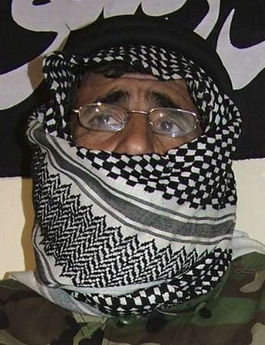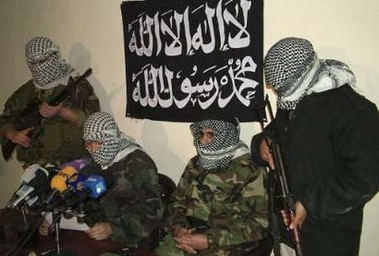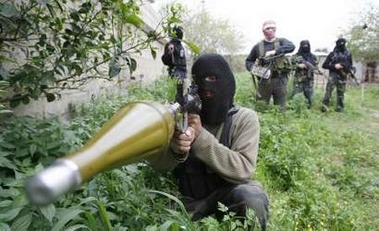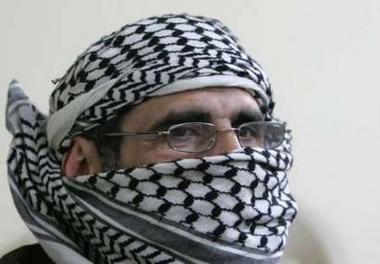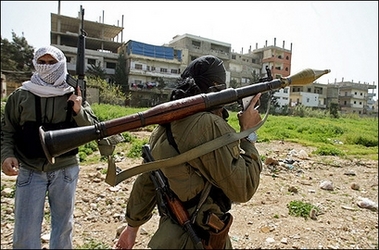The Reach of War

Two key Lebanon refugee camps are breeding grounds for Islamist anger.
LOCUS OF ANGER In Ain el Hilwe refugee camp south of Beirut, a poster shows a leader of Al Qaeda in Iraq who was killed. A Sunni group there has been sending fighters to Iraq.
Hussein Hamdan, 19, repeatedly slashed his forearms "just to make a statement." He says he wants to wage jihad against "Jews or Americans."
JIHAD LEADERS IN LEBANON Abus Sharif, left, the deputy commander of the radical Sunni group Asbat al Ansar, in Ain el Hilwe. He said the United States would be "paid back" for oppressing people. Shakir al-Abssi, leader of Fatah al Islam, right, at his compound outside Tripoli. "The only way to achieve our rights is by force," he said.
In unison, they lunged in one direction, turned and lunged in another. "Allah-u akbar," the men shouted in praise to God as they fired their machine guns into a wall.
The men belong to a new militant Islamic organization called Fatah al Islam, whose leader, a fugitive Palestinian named Shakir al-Abssi, has set up operations in a refugee camp here where he trains fighters and spreads the ideology of Al Qaeda.
He has solid terrorist credentials. A former associate of Abu Musab al-Zarqawi, the leader of Al Qaeda of Mesopotamia who was killed last summer, Mr. Abssi was sentenced to death in absentia along with Mr. Zarqawi in the 2002 assassination of an American diplomat in Jordan, Laurence Foley. Just four months after arriving here from Syria, Mr. Abssi has a militia that intelligence officials estimate at 150 men and an arsenal of explosives, rockets and even an antiaircraft gun.
During a recent interview with The New York Times, Mr. Abssi displayed his makeshift training facility and his strident message that America needed to be punished for its presence in the Islamic world. "The only way to achieve our rights is by force," he said. "This is the way America deals with us. So when the Americans feel that their lives and their economy are threatened, they will know that they should leave."
Mr. Abssi's organization is the image of what intelligence officials have warned is the re-emergence of Al Qaeda. Shattered after 2001, the organization founded by Osama bin Laden is now reforming as an alliance of small groups around the world that share a fundamentalist interpretation of Islam but have developed their own independent terror capabilities, these officials have said. If Khalid Shaikh Mohammed , who has acknowledged directing the Sept. 11, 2001, attacks and a string of other terror plots, represents the previous generation of Qaeda leaders, Mr. Abssi and others like him represent the new.
American and Middle Eastern intelligence officials say he is viewed as a dangerous militant who can assemble small teams of operatives with acute military skill.
"Guys like Abssi have the capability on the ground that Al Qaeda has lost and is looking to tap into," said an American intelligence official, speaking on condition of anonymity. Mr. Abssi has shown himself to be a canny operator. Despite being on terrorism watch lists around the world, he has set himself up in a Palestinian refugee camp where, because of Lebanese politics, he is largely shielded from the government. The camp also gives him ready access to a pool of recruits, young Palestinians whose militant vision has evolved from the struggle against Israel to a larger Islamic cause.
Intelligence officials here say that he has also exploited another source of manpower: they estimate he has 50 militants from Saudi Arabia and other Arab countries fresh from fighting with the insurgency in Iraq.
The officials say they fear that he is seeking to establish himself as a terror leader on the order of Mr. Zarqawi. "He is trying to fill a void and do so in a high-profile manner that will attract the attention of supporters," the American intelligence official said.
Mr. Abssi has recently taken on a communications adviser, Abu al-Hassan, 24, a journalism student who dropped out of college to join Fatah al Islam. His current project: a newsmagazine aimed at attracting recruits.
The arc of Mr. Abssi's life shows the allure of Al Qaeda for Arab militants. Born in Palestine, from which he and family were evicted by the Israelis, Mr. Abssi, 51, said he stopped studying medicine to fly planes for Yasir Arafat. He then staged attacks on Israel from his own base in Syria. After he was imprisoned in Syria for three years on terrorism charges, he said he broadened his targets to include Americans in Jordan.
The Times arranged to speak with Mr. Abssi through a series of intermediaries, who helped set up meetings in his headquarters at the Nahr al Bared refugee camp. Mr. Abssi, a soft-spoken man with salt-and-pepper hair, was interviewed in a bare room inside a small cinderblock building on the edge of a field where training was under way. About 80 men were in the compound, performing various tasks, including one who manned an antiaircraft gun. As Mr. Abssi spoke, two aides took notes, while a third fiddled with a submachine gun. A bazooka leaned against the wall behind him.
In a 90-minute interview, his first with Western reporters, Mr. Abssi said he shared Al Qaeda's fundamentalist interpretation and endorsed the creation of a global Islamic nation. He said killing American soldiers in Iraq was no longer enough to convince the American public that its government should abandon what many Muslims view as a war against Islam.
"We have every legitimate right to do such acts, for isn't it America that comes to our region and kills innocents and children?" Mr. Abssi said. "It is our right to hit them in their homes the same as they hit us in our homes.
"We are not afraid of being named terrorists," he added. "But I want to ask, is someone who detonates one kilogram a terrorist while someone who detonates tons in Arab and Islamic cities not a terrorist?"
When asked, Mr. Abssi refused to say what his targets might be.
[This week, Lebanese law enforcement officials said they arrested four men from Fatah al Islam in Beirut and other Lebanese cities and were charging them with the February bombing of two commuter buses carrying Lebanese Christians. Mr. Abssi denies any involvement and says he has no plans to strike within Lebanon.]
Fertile Soil for Militants
Inside the Palestinian camp, Mr. Abssi seems to be building his operation with little interference.
Maj. Gen. Achraf Rifi, general director of Lebanon's Internal Security Forces, says the government does not have authority to enter a Palestinian camp — even though Mr. Abssi is now wanted in Lebanon, Jordan and Syria on terrorism charges.
To enter the camps, he said, "We would need an agreement from other Arab countries." He said that instead the government was tightening its cordon around the camp to make it harder for Mr. Abssi or his men to slip in and out.
Palestinian refugee camps in Lebanon have long been fertile ground for militancy, particularly focused on the fight against Israel. But militants in those camps now have a broader vision. In Ain el Hilwe camp, an hour's drive south of Beirut, another radical Sunni group, Asbat al Ansar, has been sending fighters to Iraq since the start of the war, its leaders acknowledged in interviews.
"The U.S. is oppressing a lot of people," the group's deputy commander, who goes by the name of Abu Sharif, said in a room strewn with Kalashnikovs. "They are killing a lot of innocents, but one day they are getting paid back." A leading sheik in the camp, Jamal Hatad, has a television studio that broadcasts 12 hours a day with shows ranging from viewer call-ins to video of Mr. bin Laden's statements and parents proudly displaying photographs of their martyred children.
"I was happy," Hamad Mustaf Ayasin, 70, recalled in hearing last fall that his 35-year-old son, Ahmed, had died in Iraq fighting American troops near the Syrian border. "The U.S. is against Muslims all over the world."
On the streets of the camp, one young man after another said dying in Iraq was no longer their only dream.
"If I had the chance to do any kind of operation against anyone who is against Islam, inside or outside of the United States, I would do the operation," said Mohamed, an 18-year-old student, who declined to give his last name.
Hussein Hamdan, 19, who keeps a poster of Osama bin Laden in the bedroom he shares with two sisters, is a street tough attuned to religious fundamentalism. He dropped out of school at age 10, spent 18 months in jail on assault charges, and in March — "just to make a statement," he said — took a razor and repeatedly slashed both his forearms. "I want to become a mujahedeen and go to jihad in any country where there are Jews or Americans to fight against them," he said.
Lebanon has increasingly become a source of terror suspects. One of the Sept. 11 hijackers came from Lebanon, as did six men charged with planting bombs on German trains last summer. Two other Lebanese men and a Palestinian were among those accused last spring of plotting to blow up the PATH train tunnels beneath the Hudson River.
The Killing of Innocents
Mr. Abssi said he derived much of his spiritual guidance from Abu Abdullah Muhammad al-Bukhari, a ninth-century Islamic scholar. A recent study by the Defense Department's Combating Terrorism Center at West Point, N.Y., listed Mr. Bukhari among the 20 Islamic scholars who had greater influence today among militant Arabs than Mr. bin Laden.
"Originally, the killing of innocents and children was forbidden," Mr. Abssi said. "However, there are situations in which the killing of such is permissible. One of these exceptions is those that kill our women and children."
"Osama bin Laden does make the fatwas," Mr. Abssi said, using the Arabic word for Islamic legal pronouncements. "Should his fatwas follow the Sunnah," or Islamic law, he said, "we will carry them out."
His closest known association with Mr. Zarqawi involved the killing of Mr. Foley. In previously undisclosed court records obtained by The Times, Jordanian officials say that Mr. Abssi helped organize the assassination, working closely with Mr. Zarqawi.
A senior administrator for the United States Agency for International Development, Mr. Foley was leaving his home in Amman on Oct. 28, 2002, when he was shot at close range by a man who had hidden in his garage. Seven bullets from a 7-millimeter pistol struck his neck, face, chest and stomach, the Jordanian government said in court papers.
Eleven men were charged in the case, and two men have been hanged, including the gunman, Salem Sa'ad Salem bin Saweed. According to the court records, Mr. Saweed met Mr. Abssi five years earlier in Syria, where they became friends and "arranged military operations against American and Jewish interests in Jordan." Mr. Zarqawi provided the $10,000, along with $32,000 more for additional attacks, the court papers say. But in meeting Mr. Saweed, Mr. Zarqawi told him to work through Mr. Abssi, who helped the gunman with money, logistics and training in weapons and explosives.
Mr. Saweed and an accomplice in Jordan chose Mr. Foley as a target by watching his neighborhood for cars bearing diplomatic plates.
A Valid Target
In the interview with The Times, Mr. Abssi acknowledged working with Mr. Zarqawi. He said he played no part in Mr. Foley's death, but considered him a valid target. "I don't know what Foley's role was but I can say that any person that comes to our region with a military, security or political aim, then he is a legitimate target," he said.
[Mr. Foley's widow, Virginia Foley, said Wednesday that she thought her husband's killers had either been killed or jailed. "I'm appalled and surprised that there is still somebody out there," she said, when told of Mr. Abssi's current activities.]
The American intelligence official said the prosecution of Mr. Foley's killers was under the control of the Jordanians.
At the time of Mr. Foley's death, Mr. Abssi had been in jail for two months, having been arrested on charges of plotting attacks inside Syria. He ultimately served three years in prison, says Mounir Ali, a spokesman for the Ministry of Information.
Mr. Ali denied recent reports in Lebanon that Syria sent Mr. Abssi to that country to stir trouble there. "This accusation is baseless," Mr. Ali said. "After he was set free he restarted his terrorist activities by training elements in favor of Al Qaeda."
He said Syria sought his arrest in late January, but discovered Mr. Abssi had "disappeared, and no one knew where he went."
Late last November, Mr. Abssi moved into the Palestinian camp here, seized three compounds held by a secular group, Fatah al Intifada, raised his group's black flag, and issued a declaration saying he was bringing religion to the Palestinian cause. Mr. Abssi reappeared on Jordan's radar in January when police had a three-hour battle with two suspected terrorists in the northern Jordanian city of Irbid, killing one of the men. Authorities say they learned that Mr. Abssi had sent the men. A short while later, Lebanese authorities picked up two Saudi Arabian men leaving Mr. Abssi's camp, and learned both men had fought in Iraq. Two more men were found leaving the camp in February, General Rifi said.
General Rifi said officials were trying to learn as much as possible about Mr. Abssi's operation from sources and surveillance, but it was clear that their information was limited. In questioning people, security officials are showing a photograph of Mr. Abssi that is 30 years old, though it displays his most distinctive feature — two moles, one on each side of his nose.
The apparent inability to apprehend Mr. Abssi provokes fury in the men who are hunting him. A security official in one of the countries where he is wanted scowled when asked why Mr. Abssi was operating freely: "I can go lots of places to grab people, but I can't grab him."
In the interview with The Times, Mr. Abssi said he had been largely warmly received in the Palestinian camp, and that he was optimistic about his cause. "One of the reasons for choosing this camp is our belief that the people here are close to God as they feel the same suffering as our brothers in Palestine," he said.
"Today's youth, when they see what is happening in Palestine and Iraq, it enthuses them to join the way of the right and jihad," he said. "These people have now started to adopt the right path."
Mark Mazzetti contributed reporting from Washington, and Margot Williams from New York..
--------------------------------------------------------------------------------------------------------------------------------------
The U.S., not just American
interests, the target of Palestinian
terrorist leader
Submitted by admin on Mon,
2007-03-26 12:12. U.S. News
Northeast Intelligence Network,
http://www.homelandsecurityus.com/
By Douglas J. Hagmann, Director
"Most people inside our intelligence agencies aren't getting that message. Listen to what al-Abssi is saying: 'the West is waging war against Islam' and they [the Islamists] are claiming that they have the right to kill Americans inside the U.S., not just strike our military assets in Iraq and elsewhere." --U.S. intelligence source speaking on condition of anonymity to the Northeast Intelligence Network.
26 March 2007: Earlier this month, media sources reported, but essentially glossed over the threats made by Palestinian fugitive and Islamic terrorist Shakir al-Abssi, 51, a former associate of the deceased al Qaeda butcher Abu Musab al-Zarqawi. Shakir al-Abssi, a/k/a Shaker al-Abssi, is the leader of Fatah al Islam, a new Islamic terrorist organization. Al-Abssi is based in Lebanon and was sentenced (along with al-Zarqawi) to death in absentia for the 2002 assassination of U.S. diplomat Laurence Foley in Jordan. Shakir al-Abssi has a long history of violence and spent three years in a Syrian prison. He was also once a pilot for Yasser Arafat.
Last week, a U.S. intelligence source privately expressed concern to the Northeast Intelligence Network over al-Abssi and his training of operatives "with [his] goals on striking targets inside the United States in particular, along with the "reemergence of the al-Qaeda ideology and methodology in methods that are more effective at evading detection and surveillance."
"There is also a rapid morphing of Palestinian and al Qaeda ideologies, with the former group assuming the larger objectives of the latter group that seems to be escaping many people," added this intelligence source.
Referencing a 90-minute interview with media sources that included The New York Times, this intelligence source stressed that al Abssi has effectively established a military training camp that "might be crude by some standards but effective, attracting young Islamic militants from diverse places, and what it lacks in sophistication, makes up for in motivation." As pointed out in the media, al Abssi established a training facility in Lebanon, outside of the scope of the Lebanese government, and is set on rising to the level of another Abu Musab al-Zarqawi but with "America on his mind." According to this intelligence source, "the fight is no longer the Palestinians versus the Israelis, but all of Islam versus the West, especially the U.S."
To emphasize that broadened objective of al-Abssi in particular, this intelligence source pointed to his comments that "America must be punished for their presence and involvement in the Islamic world," adding that the end game is the establishment of the creation of a global Islamic nation reaches far beyond fighting US soldiers in Iraq and Afghanistan. "Most people inside our intelligence agencies aren't getting that message. Listen to what al-Abssi is saying: 'the West is waging war against Islam' and they [the Islamists] are claiming that they have the right to kill Americans inside the U.S., not just strike our military assets in Iraq and elsewhere."
Stated al-Abssi, "It is our right to hit them [Americans] in their homes as they hit us in our homes. According to our intelligence insider, al-Abssi has quickly moved up in the terrorist world to make this happen, and is "someone to watch" as he cranks out trained terrorists destined for a variety of locations, but most specifically, the U.S.
--------------------------------------------------------------------------------------------------------------------------------------
 Residents greet
Lebanese army troops in Tripoli
Residents greet
Lebanese army troops in Tripoli
Source: Reuters
Residents greet Lebanese army troops after clashes with militants of Fatah al-Islam group in Tripoli, northern Lebanon, May 20, 2007. Lebanese troops battled al Qaeda-linked militants based in a ... Full article
 Member of the
Lebanese civil defence carries a wounded
soldier after clashes with Fatah
al-Islam group in Tripoli
Member of the
Lebanese civil defence carries a wounded
soldier after clashes with Fatah
al-Islam group in Tripoli Source: Reuters
A member of the Lebanese civil defence carries a wounded soldier after clashes with Fatah al-Islam group in Tripoli, northern Lebanon, May 20, 2007. Lebanese troops battled al Qaeda-linked militants ... Full article
 Wounded Lebanese
soldier is carried to Red Cross
ambulance after clashes with Fatah
al-Islam group in Tripoli
Wounded Lebanese
soldier is carried to Red Cross
ambulance after clashes with Fatah
al-Islam group in Tripoli Source: Reuters
A wounded Lebanese soldier is carried to a Red Cross ambulance after clashes with Fatah al-Islam group in Tripoli, northern Lebanon, May 20, 2007. Lebanese troops battled al Qaeda-linked militants ... Full article
 Lebanese security
personnel capture a militant after
clashes with Fatah al-Islam group in
Tripoli
Lebanese security
personnel capture a militant after
clashes with Fatah al-Islam group in
Tripoli Source: Reuters
Lebanese security personnel capture a militant after clashes with Fatah al-Islam group in Tripoli, northern Lebanon, May 20, 2007. Lebanese troops battled al Qaeda-linked militants based in a ... Full article
 Residents greet
Lebanese soldiers in Tripoli
Residents greet
Lebanese soldiers in Tripoli
Source: Reuters
Residents greet Lebanese soldiers after clashes with militants of Fatah al-Islam group in Tripoli, northern Lebanon, May 20, 2007. Lebanese troops battled al Qaeda-linked militants based in a ... Full article
 Lebanese soldier
fires shots during clashes with
militants of Fatah al-Islam group in
Tripoli
Lebanese soldier
fires shots during clashes with
militants of Fatah al-Islam group in
Tripoli Source: Reuters
A Lebanese soldier fires shots during clashes with militants of Fatah al-Islam group in Tripoli, northern Lebanon, May 20, 2007. Lebanese troops battled al Qaeda-linked militants based in a ... Full article
 Lebanese
soldiers fire shots during clashes
with militants of Fatah al-Islam
group in Tripoli
Lebanese
soldiers fire shots during clashes
with militants of Fatah al-Islam
group in Tripoli Source: Reuters
Lebanese soldiers fire shots during clashes with militants of Fatah al-Islam group in Tripoli, northern Lebanon, May 20, 2007. Lebanese troops battled al Qaeda-linked militants based in a Palestinian ... Full article
 Lebanese
security personnel capture a
militant after clashes with Fatah
al-Islam group in Tripoli
Lebanese
security personnel capture a
militant after clashes with Fatah
al-Islam group in Tripoli
Source: Reuters
Lebanese security personnel capture a militant after clashes with Fatah al-Islam group in Tripoli, northern Lebanon, May 20, 2007. Lebanese troops battled al Qaeda-linked militants based in a ... Full article
 Lebanese
soldiers capture militant in Tripoli
Lebanese
soldiers capture militant in Tripoli
Source: Reuters
Lebanese soldiers capture a militant after clashes with Fatah al-Islam group in Tripoli, northern Lebanon, May 20, 2007. Lebanese troops battled al Qaeda-linked militants based in a Palestinian ... Full article
 Lebanese army
personnel carriers block the road to
Nahr al-Bared Palestinian refugee
camp in northern Lebanon
Lebanese army
personnel carriers block the road to
Nahr al-Bared Palestinian refugee
camp in northern Lebanon
Source: Reuters
Lebanese army personnel carriers block the road to Nahr al-Bared Palestinian refugee camp in northern Lebanon May 20, 2007. Lebanon's army battled al Qaeda-linked militants who threatened to open " ... Full article
 Lebanese
soldiers take cover behind an armoured
personnel carrier during clashes with
militants in Tripoli
Lebanese
soldiers take cover behind an armoured
personnel carrier during clashes with
militants in Tripoli Source: Reuters
Lebanese soldiers take cover behind an armoured personnel carrier (APC) during clashes with militants in Tripoli in northern Lebanon May 20, 2007. Lebanon's army battled al Qaeda-linked militants who ... Full article
Timeline Lebanon Since Hariri's Death
May 20 (Reuters) - Lebanese troops battled al Qaeda-linked militants based in a Palestinian refugee camp and the nearby city of Tripoli on Sunday and at least 38 people were killed in Lebanon's bloodiest internal fighting since the 1975-90 civil war.
Here is a chronology of some of the main events in Lebanon since former Prime Minister Rafik al-Hariri was killed, along with 22 other people, on Feb. 14, 2005.
Feb. 16, 2005 - At least 150,000 Lebanese turn Hariri's funeral into outpouring of anger against Syria.
Feb. 28, 2005 - Pro-Syrian Prime Minister Omar Karami resigns.
March 5, 2005 - Syrian President Bashar al-Assad tells his parliament Syrian troops will start phased pullout from Lebanon.
April 26, 2005 - Last Syrian soldiers leave Lebanon.
June 2, 2005 - Samir Kassir, journalist opposed to Syria's role in Lebanon, is killed in Beirut by bomb in his car.
June 16, 2005 - U.N. investigation into Hariri's killing starts.
June 19, 2005 - Lebanese parliamentary elections end in victory for anti-Syrian alliance led by Hariri's son Saad al-Hariri.
June 21, 2005 - Former Communist Party leader and critic of Syria George Hawi is killed in Beirut by bomb in his car.
Oct. 20, 2005 - U.N. investigators say high-ranking Syrian officials and their Lebanese allies were involved in Hariri's killing, in report to U.N. Security Council. Syria denies it.
Dec. 12, 2005 - Gebran Tueni, anti-Syrian member of parliament and Lebanese newspaper magnate, is killed by car bomb near Beirut.
July 12, 2006 - Hezbollah captures two Israeli soldiers in cross-border raid, setting off 34-day war in which about 1,200 people in Lebanon and 158 Israelis were killed.
Nov. 11, 2006 - Five pro-Syrian Shi'ite Muslim ministers from Hezbollah and its ally, the Amal movement, resign after collapse of all-party talks on giving their camp more say in government.
Nov. 21, 2006 - Industry Minister Pierre Gemayel is killed by gunmen. U.N. Security Council approves plans for tribunal to try suspects in assassination of Hariri and subsequent attacks. Dec. 1 - Hezbollah, Amal and supporters of Christian leader Michel Aoun camp outside Prime Minister Fouad Siniora's office in central Beirut in open-ended campaign to topple government.
Jan. 25, 2007 - Aid conference in Paris pledges more than $7.6 billion to help with debt mountain and recover from war. Five people are killed and 400 wounded in street clashes between pro- and anti-government factions.
Feb. 13, 2007 - Three people are killed in two bomb blasts near a Christian village northeast of Beirut. Lebanon says in March four Syrians confessed to the bombings and were members of Fatah al-Islam, a small Palestinian group linked to Syrian intelligence. The group deny involvement.
March 8/9, 2007 - Talks between Parliament Speaker Nabih Berri, also leader of the opposition Amal movement, and majority leader Saad al-Hariri to solve the four-month-old power struggle, end without agreement.
May 17, 2007 - The United States, France and Britain circulate a draft U.N. resolution that would unilaterally establish a tribunal to try suspects in the 2005 Hariri murder.
May 20, 2007 -
Lebanon's army battle Fatah al-Islam
militants accused of robbing a bank a day
earlier. The ensuing clashes kill thirteen
soldiers and 19 militants.



